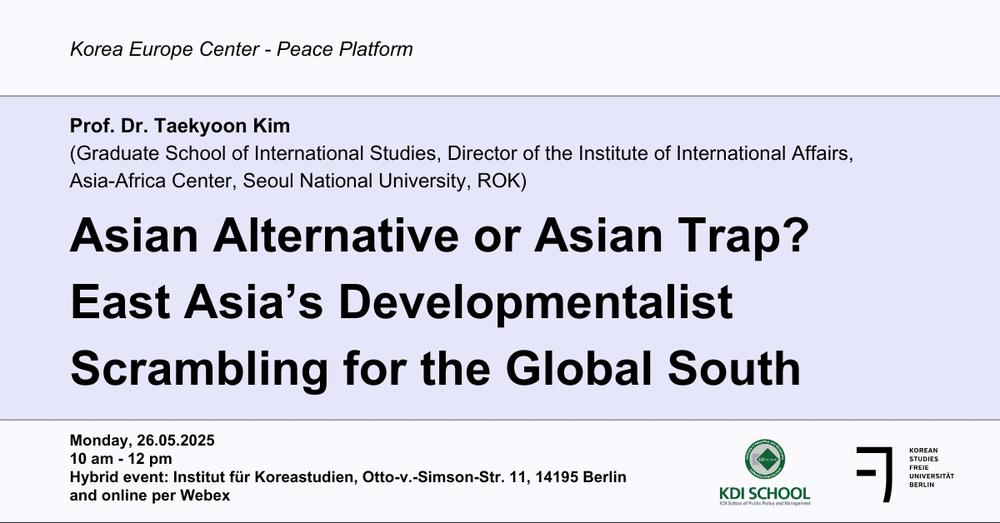Asian Alternative or Asian Trap? East Asia’s Developmentalist Scrambling for the Global South
Prof. Dr. Taekyoon Kim (Graduate School of International Studies, Director of the Institute of International Affairs, Asia-Africa Center, Seoul National University, ROK)
Lecture
Under the condition that the Global West’s hegemonic leaderships on international development have been diminishing, and the Global East – China and Russia – have been playing a significant role in replacing the former, East Asian donors – mainly, China, Japan and South Korea – will receive much more attentions from the Global South as ‘alternative’ partners who Southern states are able to trust and cooperate for their development plans. However, it is worthwhile to identify and explore a toxic concept of ‘Asian traps’ that are anchored in East Asia’s developmentalism-obsessed aid policies, with the particular reference to three Asian donors – China, Japan, and South Korea. Through their historical paths of modernization, three donor countries commonly share the state-led economic growth strategies in accordance with the developmental state thesis, albeit differently applied. The developmental state in East Asia not only justified the embedded symbiosis between governments and non-state actors – particularly, business sector – by emphasizing economic development as nation’s top priority, but also overshadowed democratic transitions as the secondary concern of the state. Legacies of East Asia’s developmental approach to economic modernization have been deeply entrenched as a strategic backbone of three Asian donors’ developmentalist foreign assistance policies towards the Global South, which would create the root cause of Asian traps.
Such a notion of Asian traps, which are riveted heavily to donors’ high-cost infrastructure projects for recipient partners in the form of tied aid, has often ended up triggering debt crises against partner countries of the Global South. It is worthwhile to note that Asian traps, despite the variation of its significance across China, Japan and South Korea, are commonly characterised by mercantile and commercialised profiles which have been developed under the vestige of the developmental state. The four generics of Asian traps include: the preference of concessional loans for infrastructure; low level of aid transparency; high level of tied aid; and the inclination to implement aid projects via bilateral channels. Those developmentalist tenets of three Asian donors come up with the sequence of events leading up to debt crises: increasing contracts with donors’ suppliers and private sector; discouraging private engagements of partner countries into development-related projects; promoting competitions and dampening aid coordination among donors; and thereby pushing recipient partners into the trap of debt crises.
In this regard, the study aims to compare three Asian donors’ developmentalism-centred aid strategies by investigating ‘Asian trap’ in two ways: first, tracing the commercialised patterns of the development state in the field of development aid across China, Japan and South Korea; and second, focusing on the fragmentation and competition by three Asian donors’ developmentalist scrambling for the Global South.
About the lecture
Taekyoon Kim is professor of international development at the Graduate School of International Studies, and director of the Institute of International Affairs as well as Asia-Africa Center, Seoul National University (SNU). He is currently vice president of the Korea Association of International Development and Cooperation (KAIDEC), and advisory committee member of the Korea International Cooperation Agency (KOICA). He served as consultant for the UNESCO and the UNRISD, as policy advisor for the Ministry of Foreign Affairs, as member of the Prime Minister Office's Committee on International Development Cooperation, as visiting fellows for the Woodrow Wilson International Center for Scholars and the Institute of Development Studies (IDS) at the University of Sussex, and so forth. His main academic research areas include international development, global governance, Global South studies and international political sociology. He published many articles to academic peer-reviewed journals such as International Sociology, Journal of Democracy, Global Governance, International Relations of the Asia-Pacific, European Journal of Development Research, and Oxford Development Studies, and also published a number of books, including The Korea State and Social Policy (Oxford University Press), and After Bandung: The International Political Sociology of the Global South (Jininjin). He received D.Phil. from the University of Oxford and Ph.D. from the Johns Hopkins School of Advanced International Studies, and took the other academic positions such as visiting professor at the University of Paris IV (Sorbonne), and assistant professor at Waseda University and Ewha Womans University.
Hybrid event: for online participation, please register here:
https://fu-berlin.webex.com/weblink/register/rf5969ad053b9d3dd05257efbba24be7a
Zeit & Ort
26.05.2025 | 10:00 - 12:00
Otto-v.-Simson Str. 11, 14195 Berlin
Online participation via Webex
Weitere Informationen
Gwendolyn Domning - g.domning [at] fu-berlin.de

